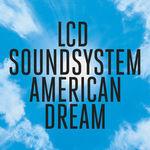
LCD Soundsystem American Dream
(DFA / Columbia)
A glorious new chapter begins for James Murphy. The big-city music icon first became an unlikely hero for those who could see themselves as him, a studied perfectionist who built his reputation as a rock savant with a sort of self-mocking pretension. He took pride in having good taste, and everyone followed his lead. Murphy could’ve knocked out a trio of critically-lauded releases without much fanfare, a typical scenario that’s plagued a numerous amount of indie rock stalwarts who’ve returned in 2017 after long hiatuses. But his idea was more scheming and calculated: to retire the LCD Soundsystem name with a three-hour extravaganza that would get made into a documentary with the purpose of achieving rock immortality. Did it matter? Well, mostly to the middle to upper class, New York City music cognoscenti. As a good New Yorker friend of mine once told me as if he were subconsciously quoting Murphy, "You just weren't there." Murphy’s existentialist dance music connected with those who had lived through a similar period, a hardworking Gen Xer with an entrepreneurial spirit who mainly spoke to an older audience that could actually afford to buy his music.
Murphy’s middle-age malaise increases tenfold on American Dream, a still living, breathing document on how he’s tried to make sense of his career choices without his larger-than-life pseudonym. His absence truly made many a heart grow fonder, and no amount of independent film scores or upscale Brooklyn wineries was going to pardon him from quitting the one project that had brought people the most joy. But the uncertainty was there: “I’ve just got nothing left to say / I’m in no place to get it right / And I’m not dangerous now / The way I used to be once,” he repents with genuine contrition on Change Yr Mind, keeping together a characteristically-sustained groove that finds inspiration by failing to resist imitation. Listen to how Murphy expertly pieces together I Zimbra and Fashion as he embodies his oddball icons David Byrne and David Bowie, a true testament to his musical-crosswords songwriting approach; you can already tell that he's regaining his creative composure. But he never comes across as snooty or elitist. In fact, when he opens the album with a romantic synth lead that recalls Suicide’s underappreciated second full-length on Oh Baby, you can readily tell how excitable he feels about sharing the music that he loves.
But it wouldn't make much of a difference if all of these influences weren’t assembled with the band’s gleaming analog backdrop. On I Used To, Murphy fends off his inevitable reservations with a spacious drone lead that combats his desires to turn it into an ominous, arena rock-style build up. That vibrant luminosity is omnipresent regardless of tone, and given that a good portion of his back catalog develops into a stiffened form of dance music, those triumphant moments are usually earned to the listener’s ears rather than conferred. How Do You Sleep?, for instance, is a testing listen even when it features the album’s most distinct groove, a biting account of his contentious relationship with DFA co-founder Tim Goldsworthy that comes across as a more sullenly dramatic interpretation of This Is Happening’s Dance Yrself Clean. Admittedly, Tonite does follow with a zany, mechanical pulse that recalls their self-titled’s outdated post-punk revival hijinks (think Beat Connection), but it almost sounds like a rambling afterthought with the occasional humblebrag for good measure. It’s possibly Murphy’s weakest single if you could describe it as such, and fares rather poorly when compared to How Do You Sleep’s? swelling movements.
At this point, Murphy transitions into American Dream’s rock portion. This last act is possibly Murphy’s more rhythmically grounded in terms of song structure, and a clear indication that he’s leaning heavier on his inner self. Sans for the towering Call the Police, which turns to early-eighties rock salvation as a jumping point to garble on about the current state of affairs with the slightest insight, the hallucinatory title track takes him down a rabbit hole of confusing, though sometimes compelling, observations. He waxes philosophical in a drug-addled state as if personifying a Denis Johnson anti-hero on the title track, where he utilizes the commonplace scenario of a one-night stand as a beginning point to take him to a more enlightened state of being. It transitions into the pronounced unease of Emotional Haircut, a more spontaneous reaction to the fleeting passage of time that comes to you like a million memories flashing all at once. Even if Murphy desperately tries to evade his present with a desire to escape it all, it’s those untold moments of regret that continue to hold him back.
Does Murphy feel more hopeful once American Dream concludes? He surely magnifies his utterly pedestrian accounts with a range of palpable emotions, even if his long-winded diatribes do tend to plod over his evanescent witticisms. He’s somehow protecting himself from potential harm, though the sometimes-braggy confidence he exudes makes an even more forceful, if exhausting, appearance. Which does add some gumption into the album’s almost Dadaist style, but it also leaves one a bit cold, unsure about whether or not we should feel compassion or indifference. American Dream does offer a lot from a songwriting standpoint, and why wouldn’t it? Murphy is a skilled producer with a deft ear for melody. But he’s somehow disrupted that valuable balance of humor and thoughtfulness found in LCD Soundsystem’s past with a more sedate offering that is riddled with mixed messages.
3 September, 2017 - 07:10 — Juan Edgardo Rodriguez